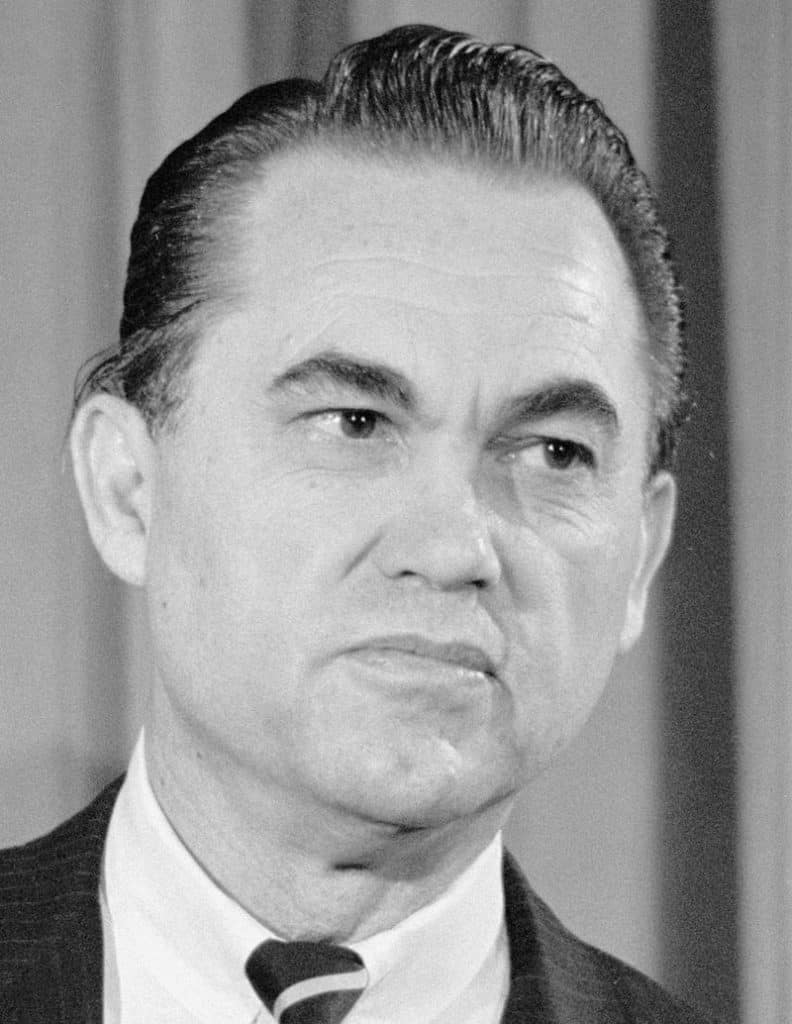Looking Backward: George C. Wallace: Born 1919, Died 1972 . . . and 1998
George McDaniel, American Renaissance, September 20, 1998

George Wallace
Like Dr. Munoz in Lovecraft’s “Cool Air,” George Wallace died twice: the first time on May 15, 1972, and then again on September 13, 1998, when he left us for good. His passing this time was a fact all but lost amongst the news surrounding the continuing cultural and political meltdown of America. Governor Wallace had been ill for a long time and had years ago passed from common awareness. The nation and the people he had stood up for in the early 1960s have largely ceased to exist today. What’s more, in most important respects, George Corley Wallace had himself ceased to exist, in a long retreat from life that began on an afternoon in May, 1972, in a Maryland parking lot. On that day, the misbegotten Arthur Bremer had, for reasons of convenience, decided to shoot Wallace instead of Nixon or Humphrey, both of whom he had stalked. (If one is to believe the FBI, of course. There is the obligatory conspiralogical theory that the FBI itself attempted to off the Governor, for reasons that are easily derived. You make the call.)
Paralyzed in that aborted murder attempt, Wallace had spent the rest of his life in a long, slow retreat from the issues and principles that attracted so many of us to him in the first place. Wracked with pain, he became burdened with an intractable guilt that he attempted to assuage with apologies. Although there would be more political victories in Wallace’s life, they would all be local, and Wallace would learn the lessons other Southern governors learned in the post-segregation era: make your accommodations with the blacks. If you want power as a white man, do the bidding of the black. In Wallace’s case, with the pain and paralysis, the need for accommodation became more urgent and more tragic as the years wore on.
In the end the apologies and the hand kissing and the tears brought him some peace of mind perhaps, but his death came as an anti-climax. Newspaper accounts of the funeral spoke of the small crowd on hand, far less than those of Alabamians such as Hank Williams or Bear Bryant, or even Wallace’s first wife Lurleen, the other “Governor Wallace.”
All the possible words have been written about George Wallace. He was a prophet whose fate it was to dishonor himself, who came to apologize for his greatest achievements and accept accolades for his most pitiable frailties. He was condemned by an accident of birth to grow old in a foreign time and an alien land, but that is a fate not unknown to many of us. His tragedy was that he could not face the loneliness of pain and defeat and so instead threw away almost everything for which he had originally stood.
Almost everything, but not quite. To be fair, George Wallace always revered his Christian beliefs above all else. Regardless of how in his slow retreat he may have turned against the Old South, the Old Race, and the Old Republic, Wallace never abandoned the Old Religion, which brings me to my only personal recollection of the Governor.
I should emphasize here that there was a time when Wallace was a great hero to me. I proudly wore his 1968 Presidential campaign button throughout that campaign and those that followed. The only time I ever saw Wallace in person was in the 1972 race, only a couple of weeks before the incident in Laurel.
Wallace made a campaign stop at the tiny rural airport near Lumberton, North Carolina, sometime around the first of May of that year. I drove over, excited to see this great man for the first time. I was not disappointed. I found him an engaging speaker with a pugnacious style well-suited to the dragon-slaying mission he had set for himself. One particular incident about that speech stands out for me still after all these years. A small group of cultural Bolshies from the local state university had shown up with their crudely drawn placards and their sullen dispositions. One in particular was carrying a sign that read: “You are an insult to Christian humanity!” In sweeping over the crowd, Wallace caught sight of this sign and abruptly stopped in mid-sentence. He started to continue then again stopped, his voice breaking with a faint but noticeable choke. “All right,” he said to the young man. “You did it. You hurt me.” He said it with neither anger nor bitterness, with only what seemed to me a little sadness. He then continued and I suspect the protestor wanted to crawl away somewhere.
If it was an act, it was masterful, but I’ve never believed it was anything but genuine. For Wallace, a former Golden Gloves fighter, politics was a fight, even a war, and he was prepared to fight that war with all the weapons he could muster, which did not exclude duplicity or bad faith. But his religion and his God were something else again, and I believe no one has ever had reason to question his sincerity regarding them. In the end, they were all that mattered. So, when George Corley Wallace finally laid his burden down, he committed himself to a God he had served all of his days. We pray that that God will accept him and keep him always and that, in the fullness of time, the truth will be revealed at last.















